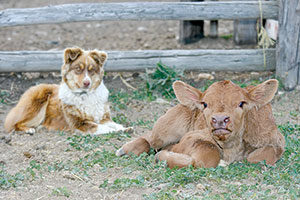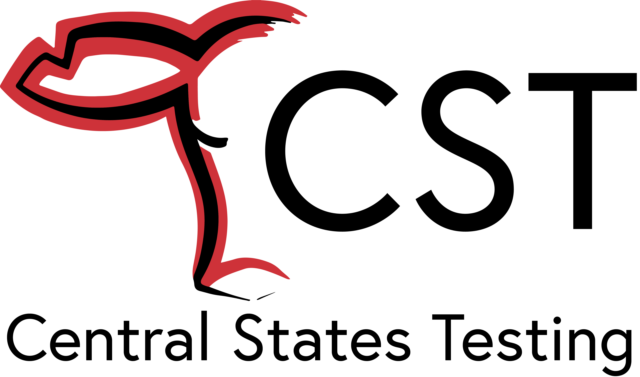The current resident dog on our outfit is a half Border Collie-half Mini Aussie cross. I have been told, and am now inclined to believe, that they bred the brains out of Aussies when they started breeding Mini Aussies. Newt, so named in honor of the operation (with a slight spelling alteration) he underwent before we got him, is about three parts Lassie and 97 parts Hank the cowdog.
It’s not that he doesn’t try. He dang sure has some instincts – and to be fair, the training he receives at our place might be a little less than ideal.
“Newt, get the heck out of the way, you stupid dog” is not a command included in Roberts’ Rules of stockdog training. Nevertheless, dogs of Newt’s caliber are more the rule than the exception around our place.
It’s really not so much the a lack of high-quality training and good breeding that limit a Marchant dog’s ability to rise to the occasion – rather, it’s more likely a product of the limited expected life span.
As is probably the case on many places, the life of a cowdog on our place is fraught with peril. If he doesn’t get stepped on or kicked in the head by a horse, it’s quite possible that he’ll get run over by the feed truck, tractor or the neighbor’s trailer.
And that’s only after he’s survived a puppyhood spent chewing up garden hoses and boots and dragging dead calf parts all over the yard. There is also the chance that he’ll meet his demise in pursuit of romance or spend a little too much time crossing the field through someone’s Suffolk flock or heifer pasture.
We’ve tried counting all of the dogs we’ve had over the past 26 or so years. I think it’s somewhere around 30, and that’s not including the occasional litter of pups we’ve given away or sold. (Yes, we have, in the past, received actual cash money for pups born and bred on our place.)
Sometimes we’ve had two or three dogs at a time. Other times, like now, we have just the lone mutt. We’ve never had a house dog, nor will we ever have a house dog.
I don’t mean to sound callous, but I’ve never felt that a dog belonged in the house, at least not our house. And, if you could see my teenage sons’ room, you might agree that a dog deserves a neater, cleaner environment.
All of this is not to say that our dogs have been less cared for or less a part of our lives than a Cockapoodle living in a San Francisco flat is a part of its owner’s life. Our dogs have their place. And that place has always been an important place in our lives.
The longest-tenured dog we had was Liza. She died about three years ago at the age of 15. At this point, I have to amend my “dogs in the house” declaration. Liza spent the last three days of her life on a rug just inside the front door after she’d crossed the potato field between our house and Grandpa’s house that had been sprayed with vine-killing sulfuric acid.
She spent a lot of time in and around the field digging for mice and gophers. The acid on the vines burned the pads on her feet in a pretty bad way. That, coupled with her age and arthritis and whatever other ailments an old dog can have, proved to be her ultimate undoing.
Liza deserved to spend her last days in our house. She was always too timid around cows, but until she got too old, she’d always jump in the truck and she never bit the kids.
Snort was a shaggy-haired dog of questionable background. We got him from a friend who ran a feedlot. Snort actually had a little sense and a lot of personality.
Whenever we’d come out the door, or especially when we returned from a trip where we’d been gone for a day or two, he would always greet the kids with a long, soulful howl. We’re not sure what happened to him. I think he probably died as a result of a neighbor’s lead poisoning on his way to visit a lady friend.
Slick met his demise one summer when he was resting under the loader when I started it to load the feed truck.
Similarly, Fly died because she always liked to dart under the truck when I stopped to open a gate. I pulled up faster than she was able to get out of the way on a snowy February afternoon.
One of my favorites was Reb. The kids got Reb as a pup from a friend, after my son spent a couple of days helping a neighbor preg-check his cows. He had an extra pup and we were an easy target. They gave him to me for my birthday that year.
He was a white short-haired heeler cross with black speckles covering him from end to end. He had a kind eye and he rarely barked.
He was quiet around cattle and seemed to have more sense than most heelers I’ve been around. (That includes ropers.) We kept him around for a relatively long time – almost six years. He was, in terms of working ability, sense and loyalty, right where I like a dog to be.
Last fall, when we were bringing cows off the mountain, the neighbor’s Great Pyrenees came out after him as I was following a little jag of cows down the road in the pickup. Reb jumped sideways to avoid the big white dog and went right under my front tire. I knew the results before I jumped out of the cab.
He had a broken back and he was yelping and snapping at anything within his reach – as a hurt, wounded dog will do. Against my better judgment, but not really caring, I immediately picked him up and laid him in the back of the truck.
I have some pretty nasty scars on my leg and hands from where he bit me while he was in his initial terrified and painful frenzy. I took him to the house, where the kids had just returned from school, so the whole family could say their goodbyes.
I didn’t argue much when my dad offered to take my place and give Reb his last rites, as it were. We listened for the crack of the .22 and then, accompanied by a tear or two, buried him next to Liza just east of the garden. We didn’t really mind that we’d have to plant the carrots in a different spot the next year.
Animal agriculture is a business. Those of us who make our living tending to God’s creatures are certainly aware of that every time we buy $4 diesel, $200 hay or $8 corn.
However, for a large share of us, we can’t escape the emotional side of what we do. When kept in its proper context, our compassion is a large part of what makes us wise stewards, keepers of the land and successful businessmen and women.
The loss of a good dog, a favorite horse or even an old half-blind cow that came up open this year, carries a sting that goes beyond the monetary value of what we produce.
When we load out our calves every year, it’s not like I’m shipping out a crate or two of sniggle widgets. It’s a part of my life that’s trotting up the chute. In my mind, that’s how it should always be. And I think I’m better for it.












